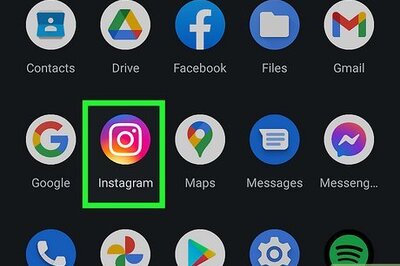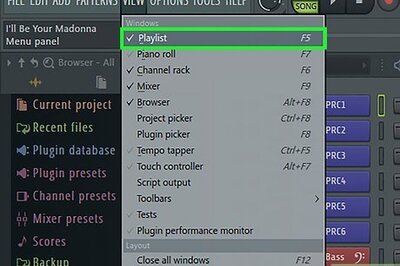
views
- Start by picking a theme or mood for your playlist. You could opt for an upbeat workout playlist, or a nostalgic early 2000’s theme—whatever your heart desires!
- Pay attention to the song order, and try to include a wide range of artists, genres, and tempos. This helps you tell a satisfying and entertaining story with your playlist.
- Listen to your playlist to see if there are any areas for improvement, and keep your playlist current by adding any awesome new songs you discover.
Creating Your Playlist & Organizing Songs

Open up a music program on your phone or computer. There are a few different websites and platforms where you can make a playlist. Spotify, Apple Music, Playlist.com, and Windows Media Player all allow you to make specific playlists, so you can choose whichever one you feel most confident with. Internet radio stations like Pandora allow you to make your own radio station, but they don’t let you compile individual songs into a playlist.

Start with a hook. Whatever your theme, genre, or taste, one thing about playlists is universal: it's got to start with a great song. Lead off with a song that'll hook everyone who listens, or will kick off your personal favorites playlist with a bang. Alternatively, maybe the order of the songs will be predetermined (as in a countdown playlist of your top 10 favorite songs). Or, maybe you're not that interested in a carefully selected order for the songs. Consider randomizing the order by hitting shuffle, or by tossing the songs in alphabetically for easy access.

Include some highs and lows. In most cases, you'll want your songs to vary in mood, tempo, and tones, or else it may get a bit repetitive or dull. Even if you're going for a super specific mood, like a Best of Black Metal playlist, try to make sure there’s a bit of variety in there, or it'll be hard to follow. Alternatively, a party playlist should probably only go up, so start with a banger and progressively get rowdier. Likewise, a go-to-sleep playlist should stay relatively sedate. Let it fade off into white noise or silence at the end.

Add a climactic song in the middle of the playlist. Whichever song is the loudest, has the most noise, or is the most interesting is the one you should put in the middle of everything. Think of your playlist like climbing a mountain: the middle is the peak, and then you gradually come back down again. Depending on the playlist theme, this could be a really fast rap song, a loud EDM song, an orchestral classical piece, or a super stirring and emotional ballad.

Listen to the transitions between songs. Some songs have abrupt endings while others will have gradual fade-outs or codas. Some rock songs end with long blasts of feedback, while other songs will fade out. Listen to how each song transitions into the next, so that you’ll be able to pick a good place for it in your song order. Avoid putting two drastically different songs next to each other. It's nice to have some variety, but going straight from Slayer to Simon and Garfunkel, for example, may sound strange. It's your playlist, but try to make the order relatively smooth. Consider adding a song that’s between two extremes to bridge the gap between them. Slayer to Led Zeppelin's "Since I've Been Loving You" to Simon and Garfunkel? That's more like it.

Aim for 30 to 50 songs total. Playlists that are too short might leave you or your audience wanting more, and ones that are too long can be a little overwhelming. Try to go for 30 to 50 songs total to hit the sweet spot for an awesome playlist. Sticking to this many songs gives you enough time to convey the theme of your playlist without dragging it out too long.

Include 1 to 2 songs per artist to avoid repetition. While this rule originally started to protect artists on radio stations, it’s a good rule of thumb to stick to in order to create variety, so you or your audience don’t get bored. As you compile your music, try to only add 1 to 2 songs by the same artist throughout the whole playlist. Having too many songs by the same artist can feel too much like just listening to an album.

Name the playlist something eye-catching and relevant. If your playlist is public, people may be able to click on it and play it for themselves. To make it enticing, try to name it something that captures the theme of the playlist and seems snappy and fun. For example, you could try “100 Most Uplifting Songs Ever" or “The World’s Most Perfect Pop Songs.”
Picking a Theme

Try a nostalgic playlist for a throwback vibe. If you want to be transported back to the past, pick a time period where you had the most fun and choose songs that remind you of it. You could pick the time period of when you grew up, when you were in school, or just one that reminds you of a good time in your life. Try 90s R&B, early 2000s pop music, 70s psychedelic rock, or even 80s jam bands.

Go for an upbeat playlist for working out. If you want to take your playlist to the gym, think about songs that will pump you up and get you ready for your workout. Try songs that have a fast tempo, a strong beat, and a solid baseline to keep you in workout mode the entire time. Dubstep and EDM songs are great options for working out.

Stick with soothing music for relaxation or meditation. For calming songs that you can listen to while studying, meditating, or winding down, go for slow, soft tempo songs with quiet base lines. You can even pick music that is specifically for meditating with white noise or nature sounds incorporated. Classical music is also great for relaxation and studying since it doesn’t have any distracting lyrics.

Lean towards popular music for parties. If you’re taking your playlist to a party or a DJ set, go for songs that most people will know. You don’t have to choose songs that are all from the top 40 list, but try to pick ones that you and your friends all know. The more people can sing along, the more they will dance and jam to the music. Different parties might need different soundtracks. A kid’s birthday party, for example, will have different music than a house show in your neighborhood.

Base your playlist off a specific mood or vibe. Some songs can bring up certain emotions, and you can make a whole playlist based on that. If you’re feeling happy, go for uplifting, supportive songs. If you’re feeling a little down, try adding melancholy or sad songs to your playlist. This is a great way to figure out a name for your playlist as well, since you can just title it after your mood. Angry playlists might have a lot of heavy metal, contented playlists might play smooth jazz, and sad playlists might have classical or slow songs.
Elevating Your Playlist Over Time

Be on the lookout for new music. If you’re trying to make an awesome playlist, you probably listen to a lot of music. As you find new music, save it to your phone or computer, so that you can add it to your existing playlist or create a new one in a few months. Try listening to the radio, other playlists, and your friends’ recommendations.

Update your playlist every few weeks. To keep your playlist fresh, try to update it every 2 weeks or so. You can add new music that you find and delete irrelevant music that you don’t like as much anymore. Updating your playlist too often can confuse your listeners, while leaving it for too long can make it feel stale.

Test out your playlist. You can put your playlist on your phone or any other portable music device and take it out with you on a run, to the gym, or to a party where you want to dance. Delete songs that don't work, and add songs that enhance the experience you're soundtracking. It's easy to make changes. You might decide that some songs fit better elsewhere, in which case you can make a brand new playlist instead.

Make collaborative playlists with your friends. If you’re feeling stuck in a rut or you want to take your playlist to the next level, consider making a playlist where multiple people can add and delete songs. This will take the pressure off of you to be the sole contributor, and it can introduce you to new music that you might not have heard of before. You can make collaborative playlists on Spotify and Apple Music.




















Comments
0 comment